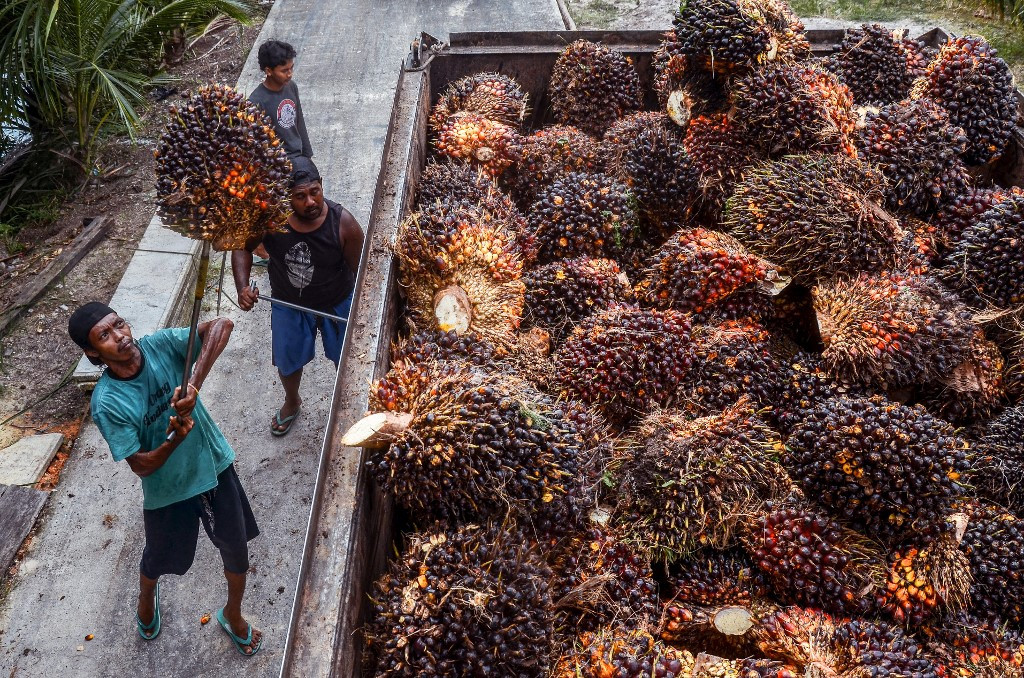Palm oil farmers plan second street protest against export ban
The Indonesian Oil Palm Farmers Association say the palm oil export ban has led to a drop in prices for fresh fruit bunches.
Change Size

O
il palm smallholders plan to organize another street protest in Jakarta to further pressure the government to lift its palm oil export ban, after having organized a sizable protest on Tuesday.
Indonesian Oil Palm Farmers Association (Apkasindo) chairman Gulat Manurung said on Wednesday that, if the ban was not reviewed within the near future, the organization had plans to bring 1 million palm kernels to the Hotel Indonesia traffic circle in Central Jakarta, where the kernels would be processed into red palm cooking oil then sold, as a form of protest.
Apkasindo previously organized hundreds of smallholder farmers to stage a protest in Jakarta and other parts of the country on Tuesday, demanding the government end a palm oil export ban that has slashed their income as fresh fruit bunch (TBS) prices continue to free fall amid an expected domestic supply glut.
Read also: Indonesia widens export ban to include CPO, refined palm oil
“We are racing against time, because the TBS prices are dropping day by day,” Gulat told The Jakarta Post on Wednesday. “The export ban directly affects the TBS prices. Please protect the 16 million oil palm farmers who have been affected by the policy.”
Indonesia, the world's top palm oil exporter, has since April 28 halted shipments of crude palm oil (CPO) and some of its derivative products in a bid to control soaring prices of domestic cooking oil, rattling global vegetable oil markets.
Apkasindo estimates that of 1,118 palm oil mills, 25 percent have stopped buying TBS from farmers after TBS prices dipped 40 to 70 percent from the price fixed by the Plantation Agency since the CPO export ban was enforced.
The association calculated that farmers had lost approximately Rp 11.7 trillion (US$799 million) by the end of April because of the ban, and Indonesia has lost Rp 3.5 trillion each month in forgone palm oil export duties.
Read also: Farmers stage protests against palm oil export ban
Marching alongside a truck filled with palm oil fruit, farmers on Tuesday held a rally outside the Office of the Coordinating Economic Affairs Minister, which is leading the government policy.
After the demonstration on Tuesday, Apkasindo met with Presidential Chief of Staff Moeldoko at the Bina Graha building in Jakarta to discuss the CPO export ban and domestic trade system for TBS for palm oil.
“Moeldoko promised to convey palm oil farmers’ aspirations to the President, especially relating to the palm oil export ban and cooking oil raw materials,” said Gulat, also on Wednesday.
Read also: Palm oil export ban will hurt us, farmers say
Sihar Sitorus of House of Representatives Commission XI overseeing financial affairs, called on the government to review the CPO export ban given that the policy would potentially affect 2.67 million oil palm farmers, and tarnish Indonesia’s credibility on the international stage.
“Seeing the many risks that will be faced by the national palm oil industry, the President needs to reconsider the [CPO] export ban,” he said in a statement issued on Wednesday.
Trade Ministry Domestic Trade Director General Oke Nurwan said the CPO export ban would be evaluated once bulk cooking oil prices fell to Rp 14,000 per liter.
Bulk cooking oil prices reached Rp 19,050 per liter as of Wednesday, according to data from the Information Center for Strategic Food Prices (PIHPS).
"Farmers are not the only ones that need to export, so does the country," he said on Tuesday.
Domestic palm oil reform
The Palm Oil Smallholders Union (SPKS) and Indonesian Farmers Union (SPI) on May 13 called on the government to use the export ban period to enforce government-set TBS pricing rules on palm oil-processing companies.
The two organizations made the request through an open letter addressed to the President, the Office of the Coordinating Minister for Economic Affairs and the Trade Ministry.
“The government needs to immediately supervise and take strict legal action against palm oil mills and companies that take part in determining TBS prices unilaterally without considering government prices,” SPKS secretary general Mansuetus Darto said in a statement issued on May 13.
There has been no response to the letter from the government, SPI chairman Henry Saragih told the Post on Wednesday.
“Our priority is how the government can urge palm oil companies to buy TBS from farmers at a good price above Rp 3,000 [per kilogram], because now the price only ranges from Rp 1,500 to Rp 1,700,” he said.
Corruption case
In a related event, the Attorney General’s Office (AGO) on Tuesday named its fifth suspect, economist Lin Che Wei, in a corruption case that has been blamed for contributing toward a domestic cooking oil shortage.
Lin is alleged to have conspired with former Trade Ministry director general Indrasari Wisnu Wardhana to help several companies secure export permits for crude palm oil (CPO) and its derivatives, between January 2021 and March 2022. Indrasari was named a suspect in late April.
“The suspect is believed to have worked with the Trade Ministry director general to aid certain CPO producers get export permits through illegal means, instead of following the domestic market obligation [DMO] requirement of 20 percent,” said ST Burhanuddin, the attorney general, during a virtual press conference on Tuesday.
The DMO was a policy put in place by the Trade Ministry in late January through mid-March. It required CPO exporters to allocate at least 20 percent of their produce for domestic needs, in the hope of reducing cooking oil prices.
Prior to Lin’s arrest, four people had been named suspects: the Trade Ministry’s Indrasari, PT Wilmar Nabati Indonesia president commissioner Master Parulian Tumanggor, Permata Hijau Group senior manager of corporate affairs Stanley MA and PT Musim Mas general manager Pierre Togar.









